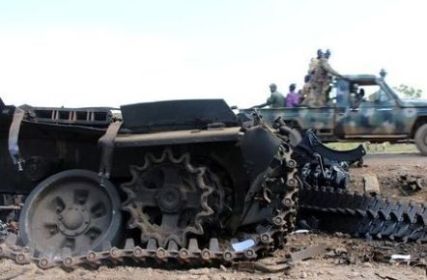South Sudan security sector leads in annual budget allocation
October 18, 2016 (JUBA) – The security sector in South Sudan continues to lead in the annual budget allocation, despite regular statements by senior government officials claiming commitment to implementing the peace agreement instead of prioritizing purchasing arms and ammunitions.

Speaking on Tuesday to members of parliament during the presentation of the draft budget, finance minister, Stephen Dhieu Dau, said much of the security budget will be used for salaries and veterans. 1.9 billion SSP goes to operation costs and 300,000,000 SSP for ‘new capital’ expenditures.
Over 5 billion South Sudanese pounds, he said, has been allocated for ‘peace expenditure’ and some disbursements again to the security organs and the presidency to help in peace related initiatives.
.
177 million South Sudanese pounds will be used for social and humanitarian affairs sector, while the infrastructure sector gets 466 million SSP and 1 billion for education sector. Health, infrastructure, food security and other service institutions receive negligible percentages.
The budget funds all branches of defence: army, navy, air force, ground and auxiliary forces. In addition to paying for the salaries, training and health care of uniformed and civilian personnel, it maintains arms, equipment and facilities, funds operations and develops and buys new equipment.
The finance minister apologized to the parliament for a delay in presenting the budget. “As you know, I have recently taken my post as minister for finance and planning. It is in these circumstances, and with apologies, that the draft budget is presented to you three months into the 2016/2017 fiscal year,” minister Dhieu said.
Dhieu claimed that his government is going to improve net oil revenues this fiscal year to SSP 7.2 billion SSP. Non-oil revenues to be estimated at 9.2 billion SSP during this year and grant from donors expected to amount to 2.4 billion SSP. He also tabled a taxation amendment bill.
Speaker of parliament Anthony Lino Makana referred the draft budget to specialized parliamentary Committees for more deliberation before returning to the house for second readings within 21 days.
The annual budget has been described as “the largest public budget.” It is a high figure in South Sudanese pounds, but a very small figure when calculating the deterioration of the exchange rate, which is 1 dollar to 8 SSP in the black market. The situation was caused by the big losses in the various economic sectors, because of the devastation and the decline in non-oil and oil revenues.
Finance minister told legislators on Tuesday that the government was seeking to overcome the obstacles facing the oil sector, and to provide the adequate atmosphere for the development process, by addressing the difficulties, securing the production requirements and encouraging industrialists to establish new industrial projects.
He called on the investors who have fled the country because of the war to come back and take part in the reconstruction phase.
Observers say optimistic investment atmosphere takes place as government banks suffer from huge debts. These debts also extend to a large number of businessmen, most of whom have left the country and transferred their assets and investments outside the country. Majority of the investors with assets and deposits of private banks operating in the country have fled after eruption of the war.
(ST)
